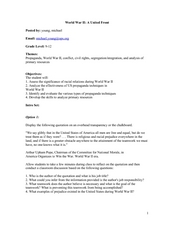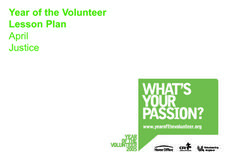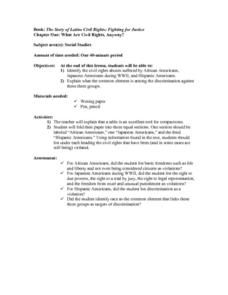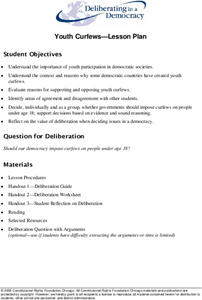Facing History and Ourselves
After Charlottesville: Contested History and the Fight against Bigotry
History doesn't always reflect all sides. Academics discover how the remembered history of the Civil War differs for White and African Americans. The instructional activity explores how Civil War monuments and celebrations have racist...
Southern Poverty Law Center
Analyzing Gender Stereotypes in Media
Why might toy advertisers use gender stereotypes to sell their products? Young people think critically about media messages and its role in gender stereotyping with a thought-provoking lesson.
National Woman's History Museum
The National Woman’s Party
Two parties led the women's suffrage movement. The National American Woman Suffrage Association (NAWSA) was a moderate organization while the National Women's Party (NWP) was more militant. Young historians investigate why members of the...
Curated OER
Fairness and Justice
In this fairness and justice activity, students complete a true/false checklist about being fair and complete discussion questions after viewing a referenced video. Suggestions for writing and students activities are also given.
Curated OER
Culminating Writing Assessment: History
Students reflect on power, privilege, and standing in American society. In this writing skills lesson, students respond to the question, "If you are denied power, privilege, and equal standings with other Americans, how would you respond?"
Just Health Action
Causes of the Causes: What Are the Root Causes of This Problem?
A "Causes of the Causes" diagram enables class members to examine the contributing factors to a problem. After reading a poem that models the process, class members, either in gorps or individually, diagram an issues they are passionate...
Teaching Tolerance
Why Do We (Still) Celebrate Columbus Day?
What are we really celebrating on Columbus Day? The resource explores the narrative behind Columbus Day and ways for people to change the perception. Scholars also review vocabulary terms associated with the topic and how attitudes have...
Curated OER
Justice Demands an End to Segregation, But it Does Not End
Students define human rights and describe how it applies to politics, economics and cultural rights. As a class, they watch a video how the Constitution was made and discuss its purpose. In groups, they present information to the class...
US National Archives
Documented Rights Educational Lesson Plan
How have groups struggled to have their unalienable rights recognized in the United States? Acting as a research team for the Human Rights Council of the United Nations, your young historians will break into groups to research...
State Bar of Texas
Baker v. Carr
Can the federal government override the state government to protect the citizens of the United States? The 1962 Supreme Court case Baker v. Carr outlines the issue of equal protection under the law. Scholars investigate with a short...
Anti-Defamation League
Martin Luther King, Jr. and Civil Rights
How far have we come and how far do we still need to go to achieve equality and full civil rights in the United States? Include a packet of materials collected in your observance of Martin Luther King, Jr. Day.
Facing History and Ourselves
Taking Ownership of the Law
The work of building and maintaining a democracy is, in the words of Justice William Hastie, "never finished." To better understand what Hastie sees as an ongoing building process, class members listen to a seven-minute podcast about two...
State Bar of Texas
Grutter v. Bollinger
A university decides not to allow a qualified scholar to enter its institution based on skin and gender—but this case is about a white female? The 2003 Supreme Court case Grutter v. Bollinger lays the foundation for open discussion and...
State Bar of Texas
Plessy v. Ferguson
Where did separate but equal originate and what does it mean? Scholars investigate the Supreme Court Case Plessy v. Ferguson. Using a short video clip, they analyze the impact the decision of legal segregation had on society in 1896....
Curated OER
Social Protections and the European Union
Sixth graders take on the role of social welfare systems in the European Union. In this European Union (EU) lesson, 6th graders discover social programs in the EU and compare them to the social programs in the United States.
Curated OER
World War II: A United Front
High schoolers interpret historical evidence presented in primary resources. In this World War II lesson, students examine racial relations during the war and then examine propaganda techniques employed by the United...
Curated OER
Civil Rights: An Investigation
High schoolers take a closer look at the political side of the American Civil Rights Movement. In this 20th century American history lesson, students research the contributions of President Johnson, Dr. Martin Luther King, Jr., and J....
National Woman's History Museum
African American Activists
Ida B. Wells, Rosa Parks, and Fannie Lour Hammer are three African American activists who stood up for change. Though living in different time periods, all three women sought justice and equality. Class members examine primary source...
Curated OER
What is Equality and How Does it Affect Me?
Students explore the concept of civil rights and the ways in which Dr. Martin Luther Kind and others utilized non-violent protests to achieve their goals. They participate in a variety of discussion and role play activities during this...
Curated OER
"Globalization"
An interesting activity that will spark a great class discussion on globalization and wealth distribution around the world. Each group is asked to accomplish the same task, but are not given equal access to materials. It is up to them to...
Curated OER
Justice
Students consider the role of justice in the formation of the United States and in the operation of today's criminal justice system. They investigate symbols associated with justice and references to justice in the Constitution.
Curated OER
The Story of Latino Civil Rights: Fighting for Justice
Middle schoolers identify the civil rights abuses suffered by African Americans, Japanesse Americans during WWII, and Hispanic Americans. They explain what the common element is among the discrimination against these three groups. ...
Deliberating in a Democracy
Youth Curfews
Don't stay out too late! Scholars analyze the need for youth curfews in a democratic society. They examine primary documents, case studies, and short video clips to form their opinions and take a position on the issue. Holding a class...
Judicial Learning Center
Getting Ready for Trial
A courtroom can be a scary place for the uninitiated. Get familiar with the process using a helpful overview of the activities that take place prior to both civil and criminal cases. The lesson explains the differences between...

























